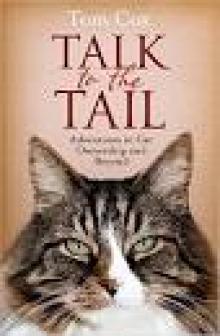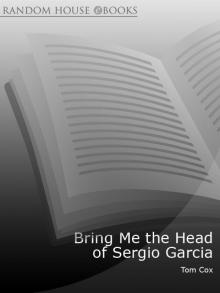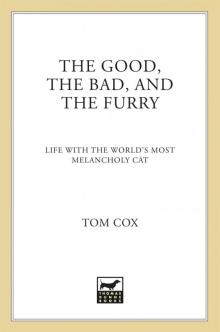The Good, the Bad, and the Furry Read online
Page 2
I could think of few revelations about my day-to-day life that would have made me feel more unmoored than if someone had found a way to measure cat IQs and discovered as a result that The Bear was a simpleton. I’d been acquainted with this cat for well over a decade now, and I felt I knew his intellectual powers. Even if those soulful peepers signified nothing and mere coincidence explained his disappearances in the build-up to every house move I’d ever made, or his eerie way of gravitating towards me every time I was ill or sad, you could not doubt that he had had the most character-building of cat lives: all nine of the standard allocation, plus seven or eight bonus ones he seemed to have been granted as a special favour.
The Bear and Ralph could not have been more different, in terms of facial expressions. The Bear went about with a permanent look of saucer-eyed worry. He’d originally been found in a plastic bag on the hard shoulder of a motorway, along with several of his siblings. In his youth his fur had all fallen out due to a flea allergy, then fallen out again due to an allergy to flea treatment medicine. He’d withstood carbon monoxide poisoning, had a hole ripped in his throat by a feral challenger, developed asthma, lost chunks of both ears, gone AWOL for almost six weeks in south London, moved house over a dozen times, and been rather brutally given his marching orders on countless occasions by Biscuit, my next door neighbours’ cat, whose Last of the Summer Wine affection he pined for. To look at The Bear was to see the worry of all that with the worry of the rest of the world piled on top of it. If the eyes are the windows to a cat’s soul, The Bear’s made those of all other cats look like they were made of tinted glass.
A few months ago, I’d had my house valued by a few estate agents, in order that Dee and I could agree on a price for me to buy her out of the mortgage. Having gone off to make one of the estate agents a cup of tea, I returned to the living room to find him and The Bear staring at each other, intensely, like two old adversaries who had not seen each other since the time many years ago when one stole the other’s dream job and childhood sweetheart.
‘Wow. Who is this?’ asked the estate agent.
‘That’s The Bear,’ I said.
‘He’s amazing. It’s like there’s a little bloke inside there.’
‘I know. A lot of people say that.’
The Bear did not blithely let the universe revolve around him, like many cats. He examined each molecule of it intently and anxiously.
Ralph, by contrast, was a cat who beamed with self-satisfaction on a near-permanent basis: an animal so pleased with himself that he walked around every morning talking about himself in the third person. But they were both needy: cats who were nervous around strangers and seemed to want something from me that, no matter how much I wanted to, I could not quite pinpoint, much less give them. Ralph wasn’t the kind of cat who could be content with being next to you. When he climbed on my chest, he expected no half measures. He wanted my undivided attention and worship. In one sense, this was fine: he was arguably the most majestic of my cats. People were always telling me how handsome he was, and he had a way of making it feel like he was granting you a rare pleasure when he let you stroke his magnificent sideburns. But the experience came with its own inherent risks. A bit like Jim Morrison at the height of The Doors’ fame, he was a paradoxical combination of beauty and questionable personal hygiene. He was the kind of cat who, were he left to fend for himself, would probably be followed everywhere by a squad of opportunistic flies, in much the same way that seagulls follow ships.
Maybe it was a measure of their very worship of an animal who was essentially a cross between a lion and a young Warren Beatty, but smaller creatures had a way of attaching themselves to Ralph. A recent example were the slugs that had infested my kitchen. I don’t really associate slugs with the height of winter, but throughout December a multi-coloured tag team of them had snuck in through one of the increasingly large holes in the walls and began making their presence felt. At first, I’d seen a couple wriggling about in the cat biscuit dispenser, like nightmarish limbless children playing in an unusually grimy ballpit. Then, a week or so later, I noticed a strange, brown, elongated raspberry in a bowl of Country Crisp I’d just poured out from a box that had been left untouched for a fortnight or so. I then noticed, somewhat more perturbingly, that it was moving. Pretty soon, perhaps having checked out my other cats and found them substandard hosts, the slugs began attaching themselves to Ralph’s back. This could come as a nasty shock, on the occasions when I was sprawled out on the sofa, watching TV with Ralph sitting smugly on top of me. I did, though, find that the upset was reduced slightly if I imagined that I was actually looking at a snake riding a small horse.
Janet (so named because Dee had been erroneously told he was a she, by the East End urchins from whom she adopted him) was my number two most unkempt and unhygienic cat – or my number one, if you were to go with Katia’s theory that Ralph and The Bear weren’t cats at all. For the last couple of years, he’d been bringing in all manner of ancient sweet wrappers and crisp packets that he’d found floating in the shallows of the lake at the bottom of my garden. He could often be found with a collection of twigs, or a considerable part of the fresh undercoat from one of my neighbours’ garden gates, stuck to his hindquarters. His dishevelled appearance wasn’t really his own fault, though. He’d been a large, muscular cat in his youth, but when his hyperthyroidism had been at its worst, the spring before last, in the midst of my break-up with Dee, he’d lost so much weight that he’d started to resemble a recently used black dust cloth. With the upping of his medication, he’d gained some weight and seemed happier, but he wasn’t the happy-go-lucky cat he used to be. Never was this more clearly illustrated than in the wrestling bouts that Shipley still attempted to involve him in. Theirs was the nearest thing any two of my cats had to a friendship: a bit like a big brother–little brother bond in which the little brother was having trouble accepting that the big brother would probably rather now be going on a cruise or watching repeats of Murder She Wrote than rolling around on the floor in a bundle of limbs.
As my two ‘cat’ cats, Shipley and Janet were also the most public, my ‘people cats’ – although in Shipley’s case I suspect this was largely because it’s very hard to subjugate and intimidate people when you’re not around them. They were always the first – and often the only – cats to greet my visitors: when my hippie folk musician friend Michael visited a couple of weeks after Will and Mary, Shipley was at him with a volley of questions almost as soon as he was through the door. This was a lot to take in for Michael, who moves at a pace that is very much his own, but thankfully Shipley soon calmed down, settling into a bout of passionate lovemaking with the velvet cape Michael had taken off and made the mistake of leaving unattended on a sofa.
There were those – Dee being amongst them – who’d suggested in the past that what Shipley really needed was the cat version of Borstal, or at least National Service, but I preferred to believe that he was misunderstood. Following me around and profanely assassinating my character was just his way of telling me he needed love. All anyone had to do was pick him up and turn him upside down and he was putty in their hands. This was a view shared by my neighbour, Deborah, who adored him.
‘Shipley came over again this morning,’ she would tell me. ‘He used some pretty awful language and had some very hurtful things to say to me, but we had a cuddle anyway. He seemed OK after that.’
It was fine for Deborah, her husband David, and me: we were humans, and knew how to turn Shipley from a grade-one gobshite into a purring lovebundle in ten seconds flat. If you were a fellow feline, though, especially one of a quiet or geriatric disposition, and didn’t have the physical capability to turn him upside down, having him constantly in your face talking trash must have been quite tiresome. Ralph, who was so strong he probably could have turned him upside down if he’d really wanted to, suffered his tomfoolery, but when the avalanche of attitude got too much would assert his dominance by calmly bashing Shipley’s hea
d against the nearest hard surface. The Bear, who abhorred all straightforward forms of violence, did his best to keep out of his way. Janet had once welcomed his advances, in a boisterous way, but now would often slink irritably away into a quiet corner.
* * *
Snow arrived the following month, which was a shame, because, for the previous few weeks, taking Mary’s advice, I’d been deliberately neglecting to clear up the sick Janet had deposited outside the back door. This had resulted in a bet with Mary and Will: my £10 said that some remnant of the sick would still be there at Easter. I was genuinely intrigued to know long a heap of sick could survive on its own in the wild. My initial reason for leaving the sick, however, had been my desire to meet a fox, then to possibly become friends with it, learning to take the good with the bad and to overlook the flaws in its personality, such as, say, the fact that it liked to eat other animals’ puke.
It had been a while since I’d had a regular local fox. You had to go back a full decade, when Janet had befriended one in the communal garden of my old flat in south-east London. This was a truly sorry-looking creature, about as near as a real fox could come to looking like an empty fox costume that had been left in a gutter, but Janet would sit happily alongside it on the lawn for long periods, simply watching the day go by. To me this always seemed an impressively non-ageist gesture from a cat who was in the prime of life and could easily have won the respect of far more robust, up-and-coming alpha animals, if he’d wanted to.
These days Janet had a lot more in common with that old fox, who had no doubt long since trotted off to the great den in the sky. I still sometimes heard Janet outside, nobly defending the house from intruder cats, but his spine felt weak when I stroked it and he was far more skittish than he’d ever been, especially at mealtimes. Sometimes he’d hang back and not eat at all. I wished I could have explained to him somehow that I was giving him the pills for his own good. Towards the close of 2010, ‘I give you these because I love you and I don’t want you to die’ was probably top of the list of sentences I would have liked to be able to translate into felinese for my cats – above even such other classics as ‘Please stop hurting me with your eyes’ and ‘It’s a carrot. You wouldn’t like it.’
Janet had always seemed less keen than The Bear, Ralph or Shipley to impress his eccentricities and hang-ups on me: if it is possible for a cat to be angst-ridden – and I think it is – that was a trait he’d been spared. When you compared him to The Bear, though, what you saw was the cat world reversing all the clichés you’d ever heard about worry acting as an ageing device. At thirteen, Janet was the younger of the pair by three years, but The Bear, who’d looked not unlike a wizened Gremlin when I’d first known him, now appeared far more youthful.
‘How old do you reckon he is? Go on, have a guess!’ I’d encourage people who were meeting The Bear for the first time.
‘Five?’ they’d say, more often than not. ‘Six? Definitely not more than eight.’
I had to face facts, though: I lived with two elderly cats, and two others who were well into middle age. At the end of January, I took the second oldest for his regular blood test at the vet’s. The new vet, who had a strong Swedish accent – all the vets who’d ever looked after my cats seemed to have strong regional accents – said Janet had lost a little weight but that it was probably nothing to worry about. As I drove home from the surgery, the rain bucketed down and washed the snow off the streets. By that afternoon, the last remaining slush had gone from the path near the back door, but, amazingly, the vomit was still there. Except now it had a green tint around its edges that seemed to be oozing outwards, and a cat – probably Shipley or Ralph, the resident mousers – had left a couple of rodent corpses next to it. These foxes were really missing out on a treat now. Where on earth were they?
Since becoming a single person with these cats, I found that my life could be viewed from two different angles. From Angle One, I was still young(ish), with none of the financial or emotional trauma of children from a previous relationship, had a nice house of my own, in a very beautiful part of the country, and a job I loved (I COULD DO ANYTHING!). Then there was Angle Two: I had little money, having bought my partner out of a mortgage, the two industries in which I earned a living – publishing and journalism – were in crisis, and I spent a lot of my days cleaning up small dead animals and looking after a bigger, poorly one, whose condition severely limited how long I could spend away from home (I COULDN’T REALLY DO THAT MUCH, IF I WAS COMPLETELY HONEST!).
In the three months that the sick had been present I’d swung from being a breezy member of the Angle One camp significantly towards the Angle Two school of thought. The rural winter had begun with an enchanting kind of darkness, but now the weeks had begun to drag and it felt more engulfing. My dad – who’d broken his spine thirteen months previously – was unwell. It was starting to feel like such a gargantuan aeon since I’d been in love that I wondered if it would ever happen again. I’d never had more friends who were ill or out of work. And, to compound all this, in early February, while DJing at a bar in Norwich, I’d burned a sizeable chunk of my hair off by setting fire to it on a tealight candle.
It’s a difficult one, setting fire to your own hair by accident. First of all there’s the fact that you lose some of your hair, but there’s also the fact that, if you’re in company while it happens, you have to put on a brave face and be kind of jovial about it. I’d laughed in front of strangers and friends as, bending down to find the groove marking the beginning of ‘We’re An American Band’ on a Grand Funk Railroad album, in a booth illuminated only by that tealight, I’d begun first to sizzle and then to slap my own head furiously to put out the blaze. I’d continued to chuckle and joke about it for the next hour, as I wandered around with my own brand new signature smell. But, later, when I examined the damage in the mirror, I was horrified to find a considerable portion of the hair on the front of my head gone. I began to regret all those times I’d laughed at Janet for catching his tail on a candle or joss stick.
It was with this in mind, as well as a general mission to make him more comfortable and happy at mealtimes, that I headed to the pet shop down the road the following day and bought him some Applaws – a cat food so upmarket it’s slightly surprising that it doesn’t come with its own croutons and miniature bag of parmesan. He wolfed this down enthusiastically, then sat beside me on the sofa, purring loudly, though if pushed I would probably say he was purring more at me than with me: his way of saying, ‘Now, see: how do you like it?’
The day after that, I got up late, having travelled down to London and back in the evening. For the journey I’d worn a smart, wide-brimmed hat, which covered my frazzled patch. A couple of friends had complimented me on the hat, but I’d also seen a small child in my train carriage look across at me then ask her mum a question about a circus. If I was being honest, I had my doubts about whether it was a look I’d stick to on a permanent basis.
As I emerged from the bathroom, wincing as I caught sight of my frazzled patch in the mirror, I heard a loud, wrenching sound from a couple of rooms away. I would compare it to the sound of a long-unoiled door being ripped from its hinges, yet it was too animal and visceral for that.
I hurried into the living room and saw Shipley standing up, alert, looking in the direction of the staircase that led to the lower floor of the house. I think, even then, that I knew, because I approached the stairs in a wide, cautious circle. To a bystander it probably would have looked like I was preparing for the world’s most apprehensive high jump. My thoughts weren’t clear or ordered, but perhaps there was a part of my brain that wondered if the noise had come from a creature brought in by the cats. Shipley had clearly been sleeping before he heard it, though, and Ralph, the other homicidal maniac, remained fast asleep on the top floor. I turned the corner onto the stairs and found Janet slumped awkwardly across two of them.
He looked deflated, like a furry cat balloon, and as I ran to him and held him I saw the la
st glimmer of life fade from his eyes. A small trickle of blood seeped from his mouth onto the stair, and I gently lifted his paw, asking myself if he could be in some kind of temporary paralysis, but I knew – even though I’d never previously been with anyone, pet or human, at the moment of death – that he’d gone. He had suffered a heart attack, and the best thing I could say about it was that he clearly did not have to endure for long whatever terrible pain had wrenched that noise from him.
* * *
The summer before last, when Dee and I had been dividing our possessions, I’d had a recurring nightmare in which I buried an old black cat, unaccompanied, in the rain. I’d told her about the nightmare, and she’d assured me that it was something I’d never have to do. Janet had been Dee’s cat long before she’d known me, so, having wrapped his body in a blanket, the first thing I did was call her. But there was no answer. I left her a tearful voicemail, explaining what had happened to Janet.
As it turned out, she did not reply until that evening. When she did, with a voicemail of her own – I was driving at the time, on my way to meet Katia and our friend Jamie, who had offered to buy me a consoling drink – I was surprised that her message, while sympathetic, did not sound more upset, or particularly inviting of a return call. But I rationalised the situation. During our first few months apart, I’d missed our other two cats, Pablo and Bootsy, terribly. Every time I saw the cover of the hardback edition of the first book I’d written about my cats, they were there, staring adorably and wonkily out at me, but they were far away, and it was highly likely I’d never see them again. To mentally remove myself from them had been a matter of survival. I’m sure Dee had done the same with the other four. She lived more than a hundred miles away now, and our existences had become entirely separate.

 Ring the Hill
Ring the Hill Talk to the Tail
Talk to the Tail Help the Witch
Help the Witch Educating Peter
Educating Peter Nice Jumper
Nice Jumper 21st-Century Yokel
21st-Century Yokel Bring Me the Head of Sergio Garcia
Bring Me the Head of Sergio Garcia The Good, the Bad, and the Furry
The Good, the Bad, and the Furry